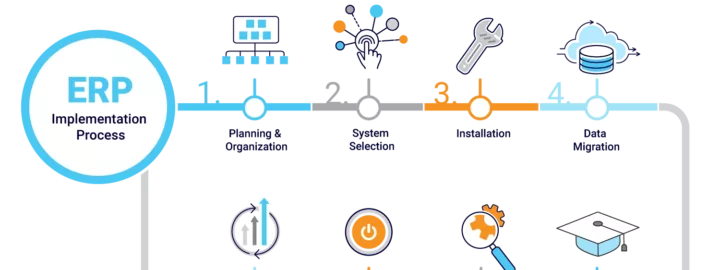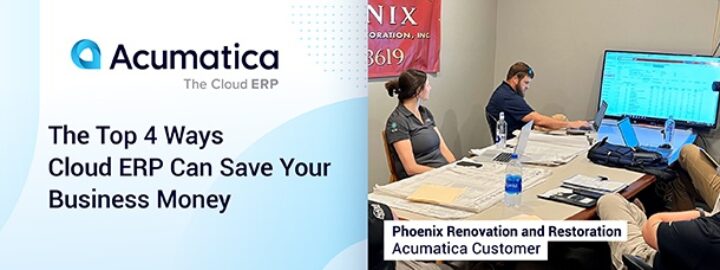Reviewed: Jan, 2023
Acumatica has eight steps to cloud ERP implementation success. Step two is assembling your team, and yes, there is a right way to do it.

As a small-to-medium-sized business (SMB), there are a few things you must do when considering a cloud ERP implementation. Attaining leadership and IT buy-in before—or at least during—the ERP selection process is one. Making sure you choose a cloud ERP provider with a tested and proven implementation procedure, like Acumatica, is another.
Acumatica’s eight-step ERP Playbook to Implementation has helped thousands of customers successfully implement our award-winning ERP solution. We discussed the first step in a recent post, Cloud ERP Implementation: Choosing Your Deployment Option. Our customers can choose Acumatica SaaS (Software-as-a-Service) or private cloud deployment, but unlike customers of other ERP providers, they’re not locked into that decision. Should circumstances dictate the need for a different deployment option, they can switch easily and without penalty.
Today, we’ll walk through the second step.
Assembling your cloud ERP implementation team
Switching from one ERP system to another is no easy feat. The installation of cloud ERP software, the transfer of data, the new business processes, and much more, will take time and effort, especially as your business continues its daily operations.
To make it a smooth transition, you will need to assemble a cloud ERP implementation team. Team members will come from different departments, each with a specific role. The amount of time each person spends on the cloud ERP implementation will be based on that role.
The team will not be left on their own to tackle the implementation. Your Acumatica partner will assist the team as implementation experts. They will provide resources, training, and support throughout the process.
Below is a list of the team members you will need and a brief description of their responsibilities.
Executive Sponsor: Also known as the “Champion”, the Executive Sponsor is a key team member. He or she will be an executive who has been a part of the process from the get-go. To keep the project on track, the Executive Sponsor will be required to communicate, organize, and make plans as the process moves forward. He or she will also be the problem solver and barrier remover until the project is complete.
Project Lead (or Project Manager): The person who takes on the position of Project Lead will be the hub of the project. He or she will communicate the project status to the company’s leadership team and to the Executive Sponsor while also coordinating resources, creating the project plan, holding meetings with the partner and team members, assessing progress, and identifying problems.
Technical Lead (Technical/Business Analyst): The technical lead creates detailed documentation of the required customizations, reports, and integrations. He or she documents custom developed functionality in accordance to documentation standards and best practices; supports data migration and security activities.
For Private Cloud, the client might have dedicated technical resource(s) that manage their infrastructure. This person or team is responsible for the procurement of the hardware and software installation and networking component; and maintains test and production environments with upgrades when needed.
Subject Matter Experts (SMEs): SMEs have specialized skills and/or knowledge of your financial requirements. Financial SMEs are needed to help define user access roles, rights, and privileges, determine segregation of duties, or establish audit requirements. Your organization may also hire outside contractors for specialized knowledge, which is called business process outsourcing (BPO).
 Pictured: Example of a project team and partner team member structure
Pictured: Example of a project team and partner team member structure
A successful cloud ERP implementation
Assembling your team and working with your Acumatica partner is an important step in a successful cloud ERP implementation. Acumatica customers in every industry can attest to this fact. Take, for example, Acumatica customer Digital Planet.
A South African-based company, Digital Planet manages smart-device fulfillment operations for financial institutions. Before becoming an Acumatica customer, they were relying on manual processes, a legacy financial platform, and other in-house developed systems. After a false start with another ERP solution, the company chose Acumatica due to our flexibility, pricing, customization, and functionality. They also chose Acumatica because of an Acumatica partner with a reputation for delivering successful implementations.
Chief Strategy and Digital Officer Zane Zietsman says in the company’s customer success story, “Our Acumatica partner, Palladium Business Solutions, was actively involved in an in-depth process consultation phase to map our requirements against Acumatica’s base functionality and provided us with a project plan and timelines upfront, giving us a good idea of what the journey would look like, what would be quick wins, and what would take a little more time and require upfront customization.”
Together, Digital Planet’s implementation team and their Acumatica partner made quick work of implementing our cloud-based ERP solution. Digital Planet is now an empowered, efficient, and aligned company, and you can be, too.
Acumatica Partners are experts at ERP implementations, who will help every step of the way.
 Canada (English)
Canada (English)
 Colombia
Colombia
 Caribbean and Puerto Rico
Caribbean and Puerto Rico
 Ecuador
Ecuador
 India
India
 Indonesia
Indonesia
 Ireland
Ireland
 Malaysia
Malaysia
 Mexico
Mexico
 Panama
Panama
 Peru
Peru
 Philippines
Philippines
 Singapore
Singapore
 South Africa
South Africa
 Sri Lanka
Sri Lanka
 Thailand
Thailand
 United Kingdom
United Kingdom
 United States
United States
















